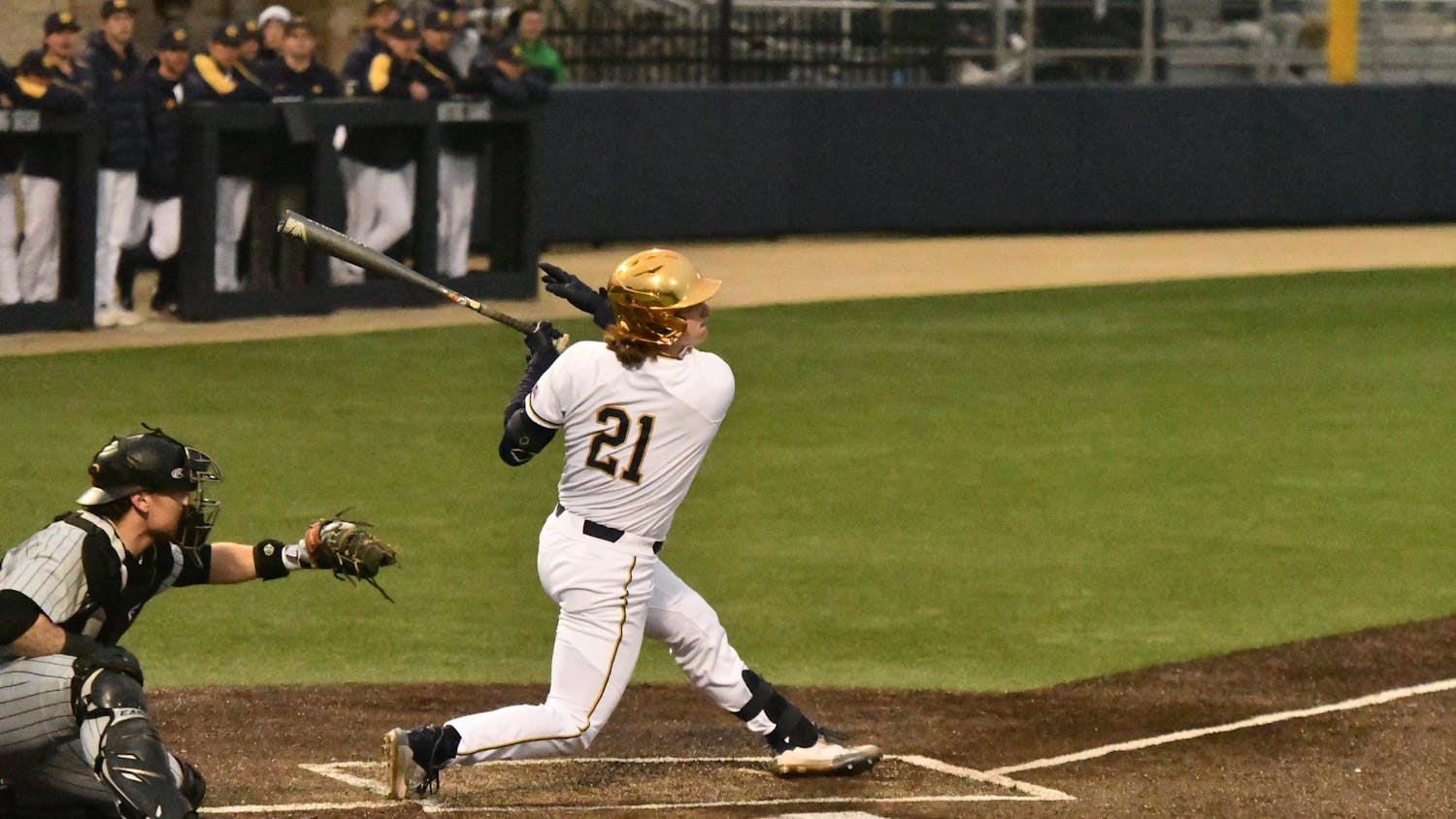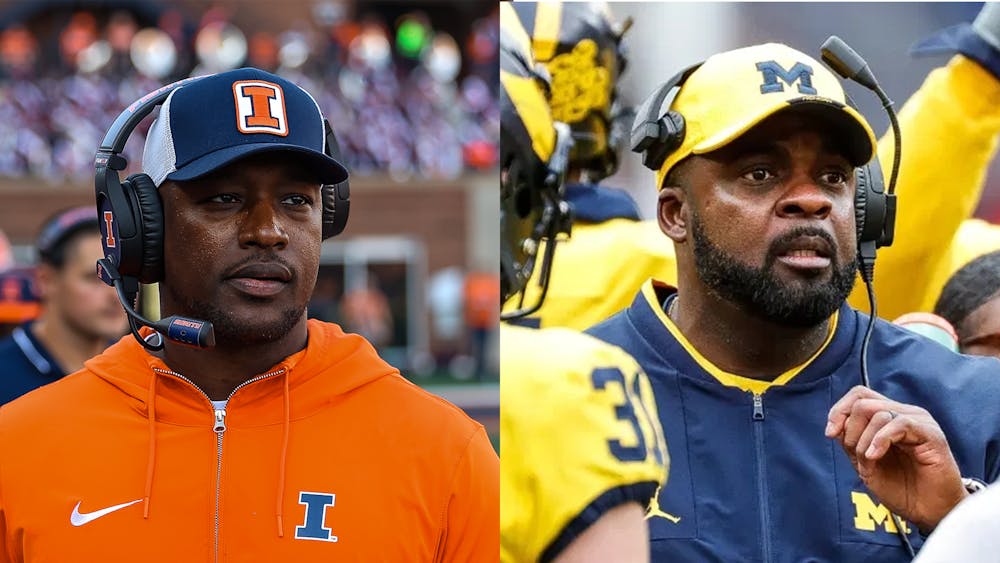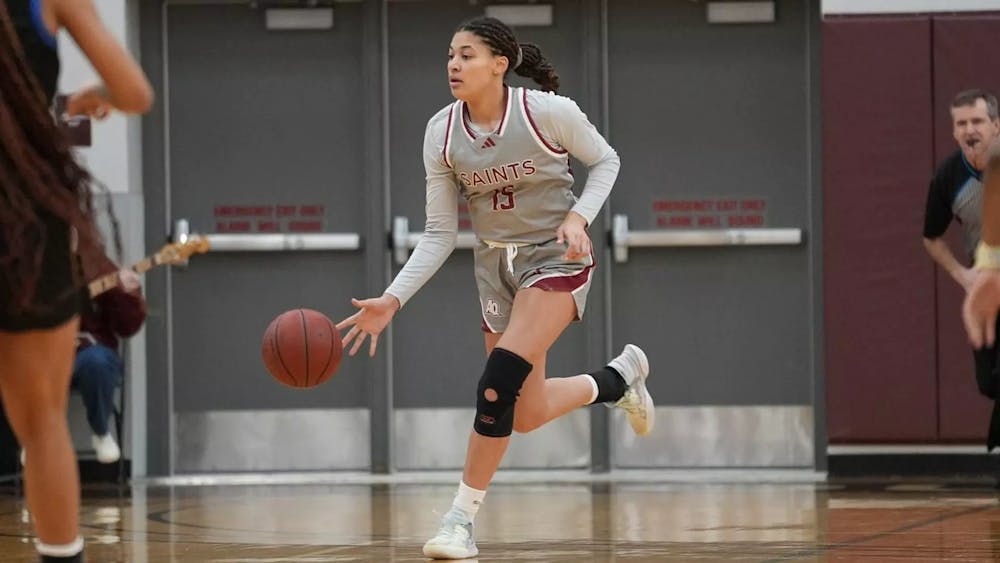2021 was always going to be a rebuilding year for Notre Dame on the gridiron.
The Irish were going to lose at least three starters on the offensive line (now four with Aaron Banks declaring for the NFL), see two starters at wide receiver go, have to replace a sixth-year veteran and a fifth-year graduate transfer in the secondary, say goodbye to their starting rover (who not-so-surprisingly became the best linebacker in the country in 2020) and find the successor to the winningest quarterback in school history.
Add to that the transfers of Ovie Oghoufo, Isaiah Rutherford, Houston Griffith, Jack Lamb and presumably more players, and it feels like an inevitable reboot. The good news for Notre Dame, though, is that they have the perfect schedule for that type of season. Here is the Irish’s 2021 slate as of right now, with each team’s 2020 performance as well as their final AP ranking (if applicable):
Sept. 5 at Florida State (3-6, 2-6 ACC), no bowl
Sept. 11 vs. Toledo (4-2, 4-2 MAC), no bowl
Sept. 18 vs. Purdue (2-4, 2-4 Big Ten), no bowl
Sept. 25 vs. Wisconsin at Soldier Field (4-3, 3-3 Big Ten), won Duke’s Mayo Bowl 42-28 vs. Wake Forest
Oct. 2 vs. No. 8 Cincinnati (9-1, 6-0 AAC), lost Peach Bowl 24-21 vs. No. 7 Georgia
Oct. 9 at Virginia Tech (5-6, 5-5 ACC), no bowl
Oct. 23 vs. No. 21 USC (5-1, 5-0 Pac-12), lost Pac-12 Championship Game 31-24 vs. Oregon, no bowl
Oct. 30 vs. No. 18 North Carolina (8-4, 7-3 ACC), lost Orange Bowl 41-27 vs. No. 4 Texas A&M
Nov. 6 vs. Navy (3-7, 3-4 AAC), no bowl
Nov. 13 at Virginia (5-5, 4-5 ACC), no bowl
Nov. 20 vs. Georgia Tech (3-7, 3-6 ACC), no bowl
Nov. 27 at Stanford (4-2, 4-2 Pac-12), no bowl
You can take the AP Poll rankings for what they’re worth considering they dropped Notre Dame to No. 5 behind Texas A&M. That despite the fact that ND made the College Football Playoff, lost by less to Alabama than A&M did and dispatched a fully loaded North Carolina team more handily than the Aggies did against a depleted Tar Heels offense missing two 1,000-yard rushers and a 1,000-yard receiver. But I digress.
Notre Dame’s 2021 schedule is an ideal one, against which a rebuilding team should be able to gain experience for its young and talented players. That way, they can be ready to make another run at the College Football Playoff in 2022 and 2023. Too bad Brian Kelly doesn’t seem to think so.
I’m writing this piece because, in my opinion, Brian Kelly just showed why Notre Dame will not win a national championship — and possibly not even make the College Football Playoff — in the four years that remain for him in South Bend. That’s because Kelly brought in Wisconsin transfer quarterback Jack Coan to join the Irish in 2021.
To be frank, this decision worries me greatly. It reeks of Kelly and his staff prioritizing the preservation of their streaks, specifically those of consecutive wins over unranked teams (32), consecutive home wins (24), consecutive wins in the month of November (12) and 10-win seasons (4).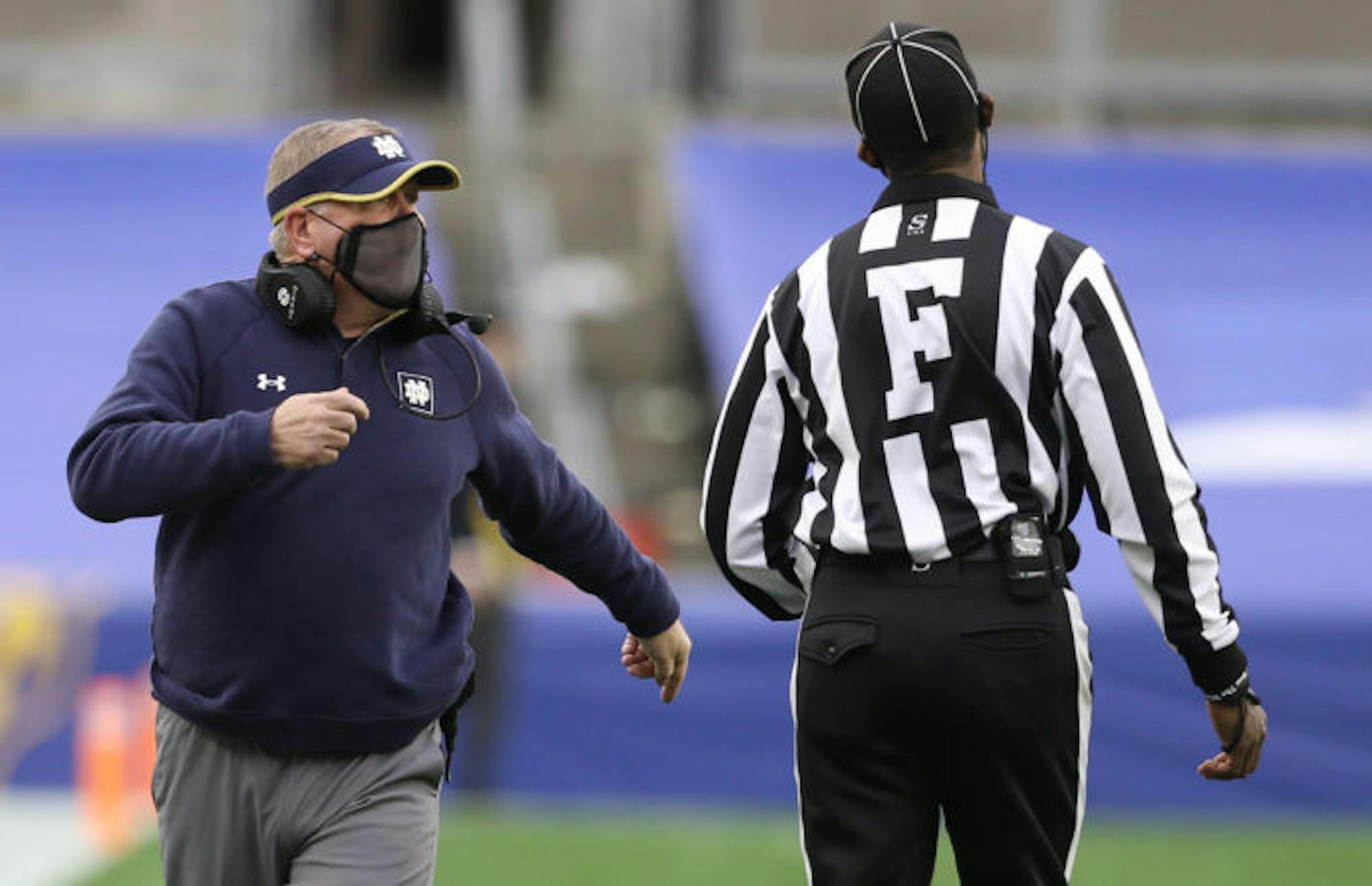
Let’s get something out of the way here: Defense has not been the issue for Notre Dame ever since Brian VanGorder’s departure. Mike Elko and Clark Lea did magnificent jobs turning the Irish into one of the premier defensive programs in the country, and I am very confident that new defensive coordinator Marcus Freeman will continue that trend — and even provide a bump in recruiting.
The problem for Notre Dame is offense. Here is what I said in a postgame column after their 45-14 loss to Michigan in 2019:
“The simple truth is that success in sports calls for offense, offense and more offense. This should have been made painfully evident to Notre Dame, far earlier than most. If the need for offensive innovation and revolutionizing wasn’t apparent to the Irish in 2012, a year their defense almost single-handedly led them to the national championship game — the offense averaged only 25.8 points per game — but came up short against Alabama, then it most certainly should be after [the Michigan loss].”
It should now be even more painfully evident after yet another embarrassing loss to the now national championship-winning Crimson Tide, this time by a more palatable final score of 31-14 in the Rose Bowl. But to drive the point home even further, here — in no particular order — are the average points per game of teams who made the College Football Playoff in 2018 and 2020.
- 2018: 48.4, 31.4, 44.3, 45.6
- 2020: 43.5, 48.5, 33.4, 41.0
- 14 games played
- 236-339 passing (69.6%), 2,727 yards (8.04 per attempt), 18 TDs, five INT, 194.8 yards per game
- 56 carries (counting sacks), 22 yards, four TDs, a career-long 25-yard rush
- 12 games played
- 228-353 passing (64.6%), 2,830 yards (8.01 per attempt), 15 TDs, three INT, 235.8 yards per game
- 116 carries (counting sacks), 485 yards, 9 TDs, a season-long 33-yard rush
I love Book for what he did at Notre Dame and for his story. A three-star recruit and former Washington State commit became the three-year starter and winningest quarterback in Notre Dame history. He beat the No. 1 team in the country at home and made two College Football Playoffs.
He also never took full advantage of the offensive skill players at his disposal or a fantastic offensive line. He didn’t see the middle of the field well and was scared to ever let it rip with his arm. Book was never an elite quarterback, and elite quarterback play is now a prerequisite for being a national championship contender. Here’s every quarterback who has ever won a Playoff game or lost by less than two touchdowns in the College Football Playoff: Mac Jones, Justin Fields, Joe Burrow, Trevor Lawrence, Tua Tagovailoa, Kyler Murray, Jake Fromm, Jalen Hurts, Baker Mayfield, Deshaun Watson, Jake Coker, Cardale Jones and Marcus Mariota.
If Notre Dame’s plan is to get another Book — and it would seem Coan is a watered-down version of him — they’re never going to win a national championship. They can’t pull off what Alabama did with Coker or even Mac Jones because the Irish can’t stack their roster with the same depth of personnel.
Then again, I doubt that’s what they are trying to do because they have to know that next year’s team loses way too much to actually be a title contender. But with a year or two more of experience, this team could make another run. Their only hope for that to occur, though, is for one of the quarterbacks they’ve recruited and (supposedly) been developing to become the kind of elite quarterback that is necessary to win a title.
The problem? This is their quarterback room:
- Junior-to-be Brendon Clark, who has a great arm but accuracy issues and possibly a bum knee — and he’s only thrown four career passes, going 2-4 for one career passing touchdown against New Mexico;
- Sophomore-to-be Drew Pyne, who is 5-foot-11, 194 pounds and has attempted just three career passes — the same number Clark attempted this past season;
- Incoming freshman Tyler Buchner, who didn’t play his senior year of high school because California canceled its fall football season due to COVID-19 — and he really only played one year as a high school quarterback anyway because he was a receiver/cornerback as a freshman and tore his ACL as a sophomore;
- And, finally, incoming freshman Ron “Ronnie” Powlus III, a legacy recruit and a borderline three-star prospect (247Sports had him as a two-star).
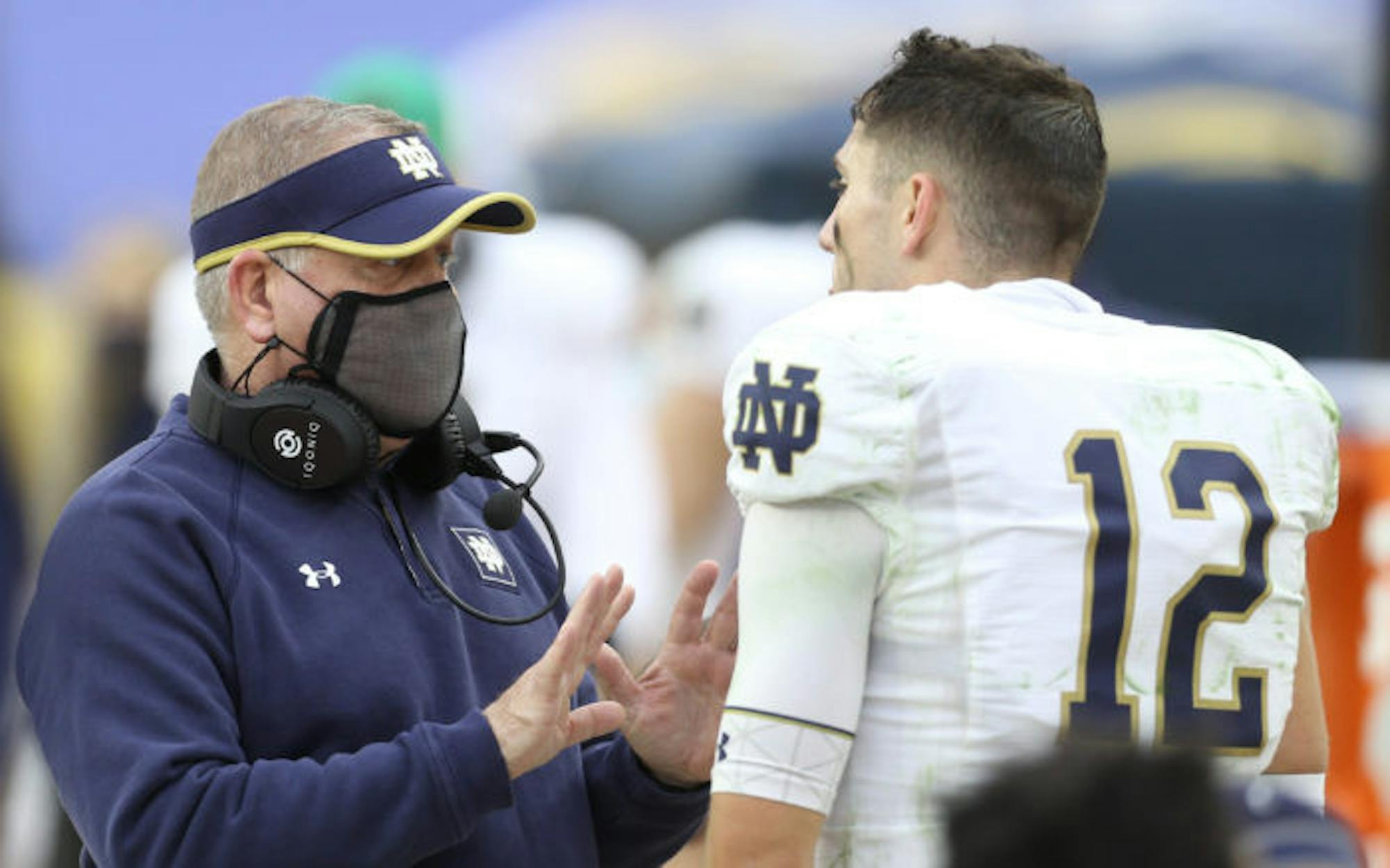
I understand the philosophy of bringing in the best players you possibly can. But at the same time, you have to think about the future. Coan has one year of eligibility remaining, meaning he will provide the Irish with no help in 2022 or 2023 when they open the season against Ohio State in September and have to play Clemson in November for both years.
I, for one, don’t want to see Clark, Pyne or Buchner — or Powlus, because we’ve seen this staff play lower-rated prospects over more highly touted players before — making his first career start to open the season in Columbus in 2022 (depending on who’s still on the roster then, of course).
The same goes for guys like Jordan Johnson, Xavier Watts, Jay Brunelle, Lorenzo Styles Jr., Deion Colzie and the 2018 wide receiver recruiting class that, to this point, has essentially done diddly squat for the Irish against marquee competition. The (supposedly) good news? With four starting offensive linemen and two starting tight ends gone, Notre Dame will have to lean on its wide receivers in the passing game more.
The bad news? The only Notre Dame wide receivers who have ever clicked under Brian Kelly do so in their final year, and even then it’s usually only one. That means it’s probably only going to be one — if any — of Braden Lenzy, Lawrence Keys III, Kevin Austin, Joe Wilkins Jr. and Micah Jones (depending on who is even on the roster next year) who becomes a borderline elite receiver next season. Don’t get your hopes up about Johnson, Watts, Brunelle or the freshmen doing anything.
The bad news is that we can’t trust Kelly to take his hands off the offensive steering wheel when he should let Jesus take that wheel — or should I say (Tommy) Reesus? (I am so sorry, but not sorry enough to delete that).
The bad news is that, if we’re being honest with ourselves, it will probably be Coan starting next year. Why else would someone with his résumé be coming to South Bend with one year of eligibility left? And because of that, the younger guys’ growth will be stunted.
Notre Dame doesn’t blow opponents out by enough points that Kelly is comfortable with putting his reserves in the game. And even if they do get up by a comfortable enough margin, it’s paradoxical because by that point Kelly takes his foot off the gas and has them run the clock out.
2021 is a year to grow. It’s a year and a schedule that is perfect for a second-year offensive coordinator and a host of young but inexperienced talent to develop. Therefore, the best thing Brian Kelly can do for his OC and his offensive players is the bare minimum.
Let Rees work through the kinks; let these players play through their mistakes. Don’t make a desperate grab at another CFP bid or New Year’s Six berth. Suffering a couple of losses might not be the worst thing in the world. After all, mistakes lead to growth, and the experience Rees and the players under him could gain from a trial-and-error season would be invaluable.
But, most importantly, open the offense up. You can’t lean on your offensive front and maybe not even your defense. If you’re going to lean on something, it better be your offense, and for that to work, you have to put forth a scheme and a group of players who are (or will eventually be) able to challenge defenses the likes of which you see at Alabama, Clemson and Ohio State.
I appreciate Brian Kelly for giving me four years of really good/borderline great football during my college experience. But it’s enormously frustrating when the discussion is constantly about competing for a national championship and, when it comes to Notre Dame, the word “competing” has to be interpreted very loosely.
So, Brian, with all due respect:
- Get away from the 12 and 13 personnel and throw Austin, Lenzy, Keys, Wilkins, Johnson, Watts, Styles and Colzie on the field
- Get Chris Tyree more reps, especially in two-running back sets
- Put someone other than Jack Coan at quarterback
- And, for just once, let the way you orchestrate your team on the field align with all the bluster you’ve been spewing about “graduating champions.”

